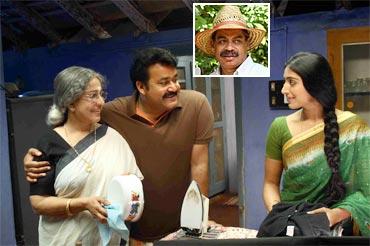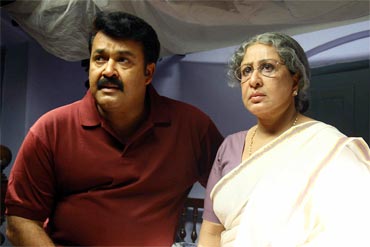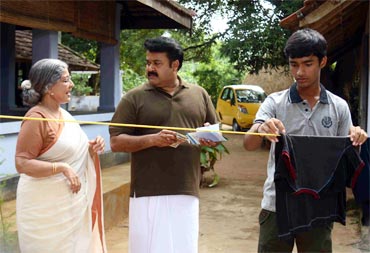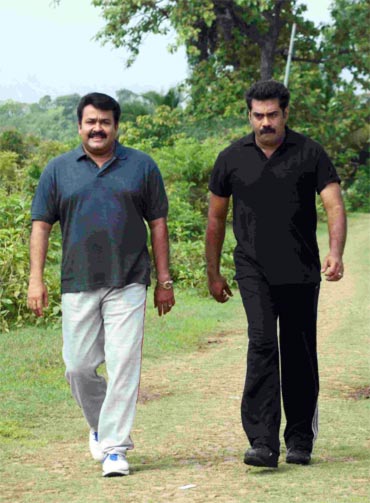 | « Back to article | Print this article |
Sathyan on Snehaveedu, Mohanlal's 300th film
Director Sathyan Anthikkad is known for earthy films that every Malayali can easily relate to. With films like T P Balagopalan MA, Sanmanassullavarkku Samadhanam, Nadodikkaattu, Mazhavilkkavadi, Thalayanamanthram, Veendum Chila Veettukaryangal, Sandesham, Manassinakkare and Achuvinte Amma, among many others, he understands the pulse of family audiences quite well.
His latest offering, Snehaveedu, also happens to be superstar Mohanlal's 300th film. The hero in the film is a villager, and the film is essentially about the warmth that he shares with his mother, played by Sheela, the heroine of yesteryears.
Here, Anthikkad talks to Meghna George about Snehaveedu and much more.
What makes Snehaveedu special?
When thinking about this film, I realised that most of the films Mohanlal has been doing these days do not have the Malayali flavour. He has played a villager quite brilliantly in a number of films earlier. I decided that Snehaveedu should be one film in which Mohanlal would play a character that the audience has been waiting for.
He was convinced when I told him this. The story is based on relationships, told in a humorous way.
'Mohanlal plays a confirmed bachelor in the film'
What is the storyline like?
The film is set in a village in Palakkad and Mohanlal plays a character named Ajayan. He has worked in the Gulf and also in Chennai, before coming back to his village where he mother Ammukuttyamma (Sheela) lives.
They have a typical old-style tharavadu surrounded by paddy fields, a vegetable garden, a temple and a village club. Ajayan is a confirmed bachelor who brags about his past flings and is the sort who likes to run away from responsibilities.
As the story moves along, a young boy named Karthik (debutant Rahul Pillai) comes to the village and claims that Ajayan is his father. Slowly, everyone starts believing the boy.
Padmapriya plays Sunanda, a distant relative, who is managing a soap manufacturing unit. Biju Menon plays a police inspector, an old friend of Ajayan.
'I've never gone after stars'
There have been quite a few experiments in Malayalam this year, like Traffic, Salt N' Pepper, Melvilasom and Adaminte Makan Abu, that did not rely on their star casts alone. Are you tempted to tread a different path in future with a different style of film making?
I have gone for a star only when the storyline demanded it. Like, Mamta Mohandas was the protagonist of my earlier film, Kadha Thudarunnu. I make films only when I have a story which is good enough to be narrated.
After doing a film, I take a break to think about a fresh subject. I don't try to make films as per the existing trends. I have always given importance to the story. I have never gone after stars. For example, I have made Achuvinte Amma with Urvashi and Meera Jasmine in the main roles.
Of course, I think there is a great change happening in Malayalam cinema of late. There were many experiments in the eighties and new experiments are happening now also, which is indeed heartening.
'Stars' crowd-pulling abilities may take a beating'
Do you think viewers are ready to accept such experiments?
Viewers have always supported good films. The success of the new experiments in Malayalam cinema has been encouraged by a supportive audience.
In your opinion, what is the future of 'stars' in Malayalam cinema?
The stars will always be there but their crowd-pulling abilities may take a beating. There is still space for brilliant actors like Mammootty and Mohanlal, though.
Your films almost always have a rural setting. Why?
My stories are related to the surroundings and the lifestyle I am familiar with. My ideas have changed from the time I made Kurukkante Kalyanam. There are changes which are evident in my films as well. My characters, too, are modern though they may stay in rural areas.



